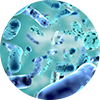
Probiotics are live bacteria that can have a beneficial effect on human health. They are generally called lactic acid bacteria. These are mainly bifidobacteria and lactobacilli, then streptococci, enterobacteria and the yeast Saccharomyces boulardii.
Foods rich in probiotics include:
The consumption of these foods is suitable from the point of view of maintaining the proper function of the intestines.
To ensure the therapeutic effect of probiotics, a daily dose of 10-20 billion live bacteria for an adult and 5-10 billion live bacteria for a child is necessary.
If the product also contains a prebiotic (supports the growth and activity of beneficial bacteria, most often inulin and its derivatives), it will last longer in the digestive tract. Avoid taking probiotics with iced or hot drinks.
Probiotics should be taken as far away from antibiotics as possible. It is recommended to continue for about a week after the end of the treatment.
Use of probiotics:
There is an abundance of probiotics in various pharmaceutical forms available in pharmacies.
Do not hesitate to contact your pharmacist when choosing a specific preparation. It will take into account the current state of health and needs.
Free according to the web portal of the Czech Chamber of Pharmacy for the public Lékárnické kapky, 29/02/2024

30. 5. 2025
How to treat hay fever? Hay fever is an inflammatory disease of the nasal mucosa caused by an inappropriate reaction of the immune system to foreign bodies. Most often ...

29. 4. 2025
The irreplaceable role of pharmacistsFor 5 years, pharmacists have had the opportunity to view a patient's medication record (with their consent) and thus contribute to ...